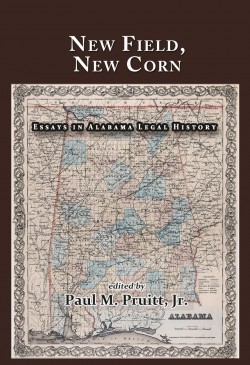
Eight University of Alabama School of Law alumni have been published in New Field, New Corn, an anthology of research papers that explores Alabama legal history and the state’s legal and judicial figures.
The anthology, published by Quid Pro Books in New Orleans, covers Alabama legal history from the pre-Civil War era through the civil rights era, and the essays were first written when the contributors were students at UA Law.
“These are youthful scholars and yet their work is original, and it significantly adds to our knowledge,” said Paul M. Pruitt, Jr., Special Collections Librarian in the Bounds Law Library.
Pruitt edited the anthology and penned the introduction, “Alabama Legal History as a Field of Study,” while Professor Bryan Fair wrote the foreword, “Critiquing our Present, Interrogating our Past.”
Nearly 25 years ago, Fair taught his first seminar at the Law School on Race, Racism, and American Law. His class read portions of Derrick Bell’s casebook and the students prepared research papers. He said he was honored and delighted when the editors of the UCLA National Black Law Journal agreed to publish the collection of essays, along with one of his articles.
“Since then, many faculty at Alabama Law have supported students in their quest to publish scholarly articles,” Fair said. “Pruitt’s New Field, New Corn is an exceptional illustration of such an academic collaboration.”
Seven of the essayists completed their research while enrolled in Alabama Legal History, a course taught by Professors Tony Freyer and Pruitt. An eighth writer was chosen from Fair’s seminar on Equal Protection.
The title of the anthology is derived from an adage credited to Sir Edward Coke, who was quoting Geoffrey Chaucer, when he asserted, “Assuredly out of the old fields must spring and grow the new corn.”
“We’re only beginning to scratch the surface,” Pruitt said. “The more background we have the better we are able to judge, assess and draw conclusions.”
The essays cover a variety of topics, from economics, race, education, and concerns of the legal profession, to legal doctrine, to illustrate how those issues influenced Alabama’s development. While some of the contributors chose topics based on scholarly interests, a few researched and wrote about how Alabama’s laws affected their hometowns.
Courtney Cooper (’14), a native of Eutaw, researched the evolution of the Alabama Constitution, the disenfranchisement that was built into the constitution and how the constitution was illegally ratified.
“I had concerns about the constitution, the fact that it was illegally ratified and that we continue to live under something that does have some corruption behind it,” said Cooper, an attorney for Dodson Gregory LLP in Birmingham.
Cooper grew up in Alabama’s Black Belt region, where the effects of the 1901 constitution, which deliberately disenfranchised black and poor white voters, are still felt today. She began researching the constitution while an undergraduate at UA, and she said she was surprised to learn “several U.S. Supreme Court cases before 1901 encouraged what was ultimately done by Alabama legislators.”
Ellie Campbell (’13) researched Strange v. State, the first case in Alabama where an all-white jury convicted a white man for killing a black man in Anniston in 1965.
Campbell, a native of Anniston, shaped her essay around the trial and what had been happening in Alabama in the years preceding the trial so that a white jury could convict Hubert Damon Strange of killing Willie Brewster as he drove three friends home one evening.
Campbell returned to her hometown and interviewed Judge Robert Parker because her father, James M. Campbell, who also practices law in Anniston, knew him and was familiar with the case.
As she researched the essay, Campbell discovered her grandfather, James J. Campbell, was among a group of more than 250 Anniston citizens who paid for a full-page advertisement in the Anniston Star, announcing a $20,000 reward for information on the killing.
“That was kind of a turning point,” said Ellie Campbell, the Reference and Instruction Law Librarian at the Grisham Law Library at the University of Mississippi. “Prior to the mid-1960s, middle class white folks in the South had been silent. They didn’t like the violence, but they didn’t protest it too much because they didn’t want to be targets.”
Paul Rand (’13) researched the way that 19th Century Alabama courts handled what are called parol problems, or the admissibility of evidence that contradicts a written document.
The issue arises when a contract says one thing, but someone involved says what the contract says doesn’t reflect the agreement. Rand found the law on how to handle those situations changed before, during and after the Civil War.
“I was surprised, and a little amused, to learn how complicated the Confederate bureaucracy became by the end of the war,” said Rand, a trial lawyer for the Community Law Office, which provides criminal defense services for indigent defendants in Jefferson County. “That’s totally at odds with the image most history books give of the Confederate government.”
The anthology provides insight into elements of Alabama legal history that don’t garner a lot of research attention. As a result, the field, long considered an important part of Southern history, is wide open for new development.
“There is not nearly enough historical work out there about the development of the law in our state, so it’s very important that the university encourage and support Dr. Pruitt’s work in that field,” Rand said. “It’s a public service of the kind that the Law School is there to provide, and it’s great that it has been doing it.”